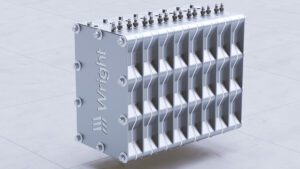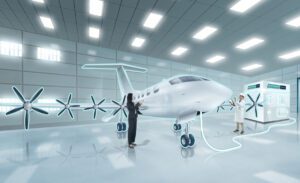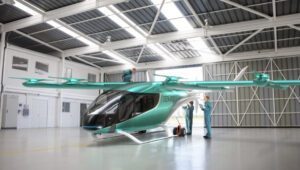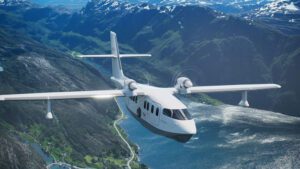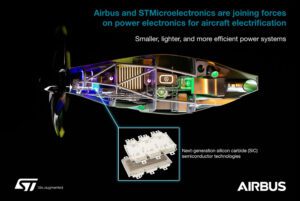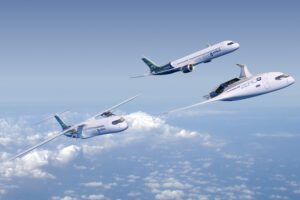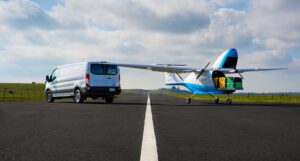Wright Electric, provider of electric propulsion systems for regional aircraft, has launched an initiative to develop batteries targeting 1,000 watt hours per kilogram (Wh/kg) pack-level specific energy. “When I founded Wright, the best vehicle batteries had [specific energy] below 250 Wh/kg,” said Jeff Engler, CEO of Wright. “Now several large manufacturers are advertising cells at… Read more »
Search Results Found For: "electric aircraft"
Inverters on a Plane: Testing of Electric Powertrain from Prototype Development to Certification & Systems
“I am testing these motor flying Inverters on this motor flying plane” Motors, inverters, and power systems for electric aircraft have strict requirements for weight, efficiency, and safety. For this reason these motors are pushing technology, going to higher voltages, high phase counts, and unique topologies for both the motors and inverters. Many of these… Read more »
Inverters on a plane: testing of electric powertrain from prototype development to certification and systems (Webinar)
“I am testing these motor flying Inverters on this motor flying plane” Motors, inverters, and power systems for electric aircraft have strict requirements for weight, efficiency, and safety. For this reason, these motors are pushing technology, going to higher voltages, high phase counts, and unique topologies for both the motors and inverters. Many of these… Read more »
Amprius unveils ultra-high-power, high-energy lithium-ion battery for EVs and electric aviation
Amprius Technologies, a battery manufacturer in California, has announced a new ultra-high-power, high-energy lithium-ion battery cell that discharges at 10C and delivers 400 Wh/kg specific energy. The cell is designed to deliver high power output, making it suitable for the electric vertical takeoff and landing aircraft (eVTOL) and unmanned aerial vehicle (UAV) industries. Amprius aims… Read more »
Nidec and Embraer to jointly develop an electric propulsion system for the aerospace industry
Japanese electric motor manufacturer Nidec and Brazilian aircraft manufacturer Embraer have established a joint venture (JV) company, Nidec Aerospace, to develop electric propulsion systems for the aerospace sector. Nidec will own a 51% share of the JV and Embraer will own the remaining 49%. The newly-established company will develop and manufacture the electric propulsion system… Read more »
Electric Power Systems to provide aviation battery system for Elfly’s electric seaplane demonstrator
The Norway-based Elfly Group is building an electric amphibious aircraft, inspired by the venerable de Havilland Twin Otter and Grumman’s Mallard. The Noemi seaplane is designed for 200-kilometer air journeys, and will be powered by two electric motors with up to 1 MW combined output. A prototype is expected to make its first flight in… Read more »
ZeroAvia to test hydrogen–electric regional jets with MHIRJ
British-American hydrogen aircraft manufacturer ZeroAvia has identified applications for hydrogen-electric, zero-emission propulsion for regional jet aircraft. The hydrogen-electric CRJ aircraft would be equipped with two ZeroAvia regional jet engines (derivatives of the ZA2000 engine class) to match the existing performance, and ZeroAvia analysis suggests it could support up to 60 passengers with a range of… Read more »
Airbus and STMicroelectronics partner on power electronics for aircraft electrification
Airbus, an aerospace company, and STMicroelectronics, a semiconductor manufacturer, have partnered on power electronics R&D for future hybrid-powered aircraft and full-electric urban air vehicles. The collaboration builds on previous evaluations of wide bandgap semiconductor materials for aircraft electrification by both companies. The partnership will develop silicon carbide (SiC) and gallium nitride (GaN) devices, packages and… Read more »
MIT builds megawatt electric motor to help electrify aviation
MIT engineers are building a 1-megawatt (MW) motor to help facilitate the electrification of larger aircraft. The team has designed and tested the motor’s primary components and proved that the connected components can generate 1 MW of power at a weight and size comparable to current compact aircraft engines. The team anticipates a battery or… Read more »
Pyka receives $7-million California tax credit to expand zero-emission autonomous aircraft manufacturing
Electric aircraft startup Pyka has been awarded a $7-million California Competes Tax Credit from the California Governor’s Office of Business and Economic Development (GO-Biz)—an income tax credit for businesses that locate or grow in California. Pyka’s technology includes autonomous flight control software, flight computers, high-energy-density batteries, advanced electric propulsion systems and carbon-composite airframes. The company… Read more »




